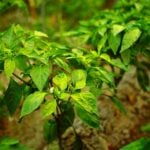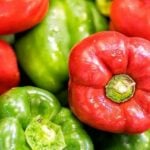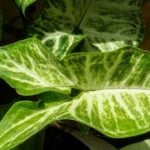There are a lot of materials you can use in composting. They can include green vegetables and old newspaper. You can also source for high-quality compost for your garden by purchasing mushroom compost.
Mushroom composts are waste products derived from the industrial production of mushrooms. These mushroom composts mainly consist of organic matter such as horse dung, wheat straw, ground chalk, and dried blood. Mushroom compost can provide your plants with adequate nutrients to support healthy growth.
When composted properly, mushrooms can provide your
When shopping for mushroom compost to use in your garden, you want to ensure that you check that the pesticide content is low. When mushroom compost is produced in the industry, chemicals are often added to treat the straw and to ward off gnat and other insects from the decaying matter. For the best mushroom compost, you want to ensure that there are no chemical compounds added to the mix to avoid contamination of your plants.
Before you can truly understand how to use mushroom compost, you need to first familiarize yourself with what mushroom compost is.
What is Mushroom Compost?
Mushroom compost can simply be identified as a compost material that is made from mushrooms. They are available for purchase from organic
Before you go shopping for mushroom compost, you need to know that there are various types of mushroom compost available in the market. While all of them are made from mushrooms, they each undergo a slightly different kind of manufacturing process that affects the quality of the resulting compost.
The different types of mushroom compost include:
Mushroom Substrate
The mushroom substrate is the common type of mushroom compost you can find. The process of manufacturing mushroom substrate usually involves making use of a medium that includes a mix of ingredients. The ingredients used in the substrate can be a mix of chicken or horse manure and gypsum or wheat straw. Other ingredients can be used as a substrate, but these are the most commonly used.
The production process usually begins with the addition of large bales of wheat straw to cool water and leaving it to soak for 5 to 10 minutes. Once the straws are completely moist, it is then cut into tiny pieces by the help of a chipper. The manufacturer then blends the gypsum and manure together, and then slowly includes the chipped straw into the mix. The resulting mixture is now kept in hot compost piles and left for 2 to 3 weeks. For the best result, the piles will have to be turned and watered regularly to speed up the decomposition process. After the wheat seeds have died off from the excess heat, the piles are then transferred into rows and left out for a few more weeks to further compost.
The compost pile will be ready for pasteurizing once the piles appear brownish in color. The reason for pasteurizing is to kill any weed seed or bacteria that are left in the compost. The resulting compost is clean and ready for use in growing mushrooms.
Spent Mushroom Substrate
Spent mushroom substrates are the type of mushroom compost you purchase from mushroom farms. They are termed “spent” because they are no longer fit for use in growing mushrooms but can be recycled by adding it to a compost pile.
Compared to the mushroom substrate, these types of mushroom compost are low in nutrients and can only be used in amending
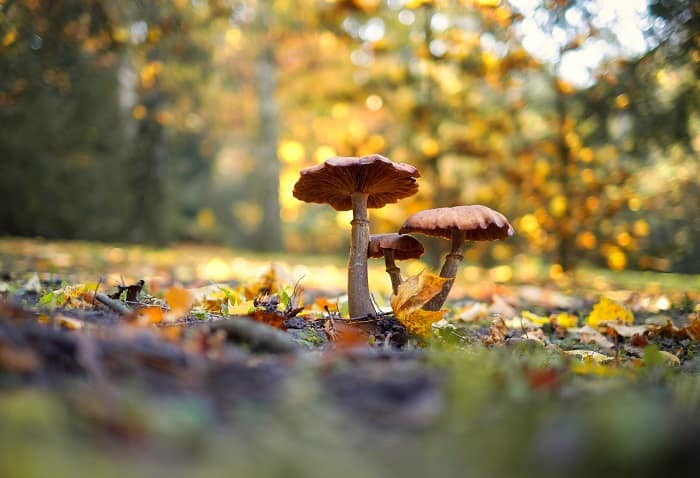
You are likely to find mushrooms growing in your garden when you make use of spent mushroom substrates. I strongly advise not to eat the mushrooms you find in your garden (as a result of spent mushroom substrate) so as to avoid consuming any chemical compound that might have been added to the mix. Carefully remove any mushroom as soon as they appear to prevent them from reaching maturity.
Substitute Mushroom Compost
Other materials can be used in mushroom compost. But before they are added, they are pasteurized to kill off all the bacteria that can encourage the growth of mold. Some of the popular materials used in substitute mushroom composting include coffee grounds. This is because it is readily available and can be purchased for use in a home-base mushroom growing setup. You can purchase coffee grounds for free from commercial coffee shops depending on your area.
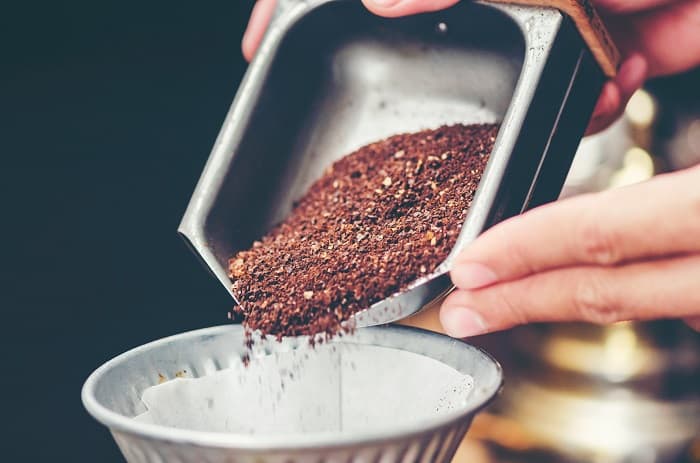
Other materials that are used as a mushroom compost base include horse or chicken manure, coconut coir, peat moss, soybean meal, and hardwood dust. Once these materials are broken down, they can provide your
Uses of Mushroom Compost
You can use mushroom compost on your plant
- A slow-release fertilizer to neutralize acidic
soil . - Added to clay
soil to improve water retention. - Fresh manure compost can be used as mulch for your plant root.
- A dresser for the top of your lawns to prevent the growth of weed.
- Mushroom compost can be used in vermicomposting as a worm bed.
- It can be added to a tumbler composter to speed up the decomposition process.
FAQ’s
How do you use mushroom compost?
Mushroom compost has been known to increase the health and vitality of plants. This compost will naturally fertilize and stimulate the growth of plants. It also helps to improve soil structure and texture. The nutrient content of compost is very high, making it an effective source of nutrition for your plants. Mushroom compost is a rich and natural fertilizer that is easy to use. It is available in liquid, granular, or pellet form. It is safe for use on any type of plant, whether indoor or outdoor.
Mushroom compost can be used on a wide variety of plants.
You can apply it directly to your garden or use it as a mulch for your houseplants. Compost can be used around your houseplants and shrubs. It will help to keep your plants healthy, and it will prevent disease. It is also great for the lawn, and you can use it to fertilize your lawn. It can be used to water your garden plants as well.
Mushroom compost is a natural and organic fertilizer that can be used to enhance the growth of your plants. Compost is made from the decayed matter of food scraps, leaves, grass clippings and garden trimmings. It contains many nutrients, including nitrogen, phosphorus, potassium, magnesium, calcium, sulfur, copper, zinc and manganese. What are the benefits of using mushroom compost? Mushroom compost has been known to increase the health and vitality of plants. This compost will naturally fertilize and stimulate the growth of plants. It also helps to improve soil structure and texture. The nutrient content of compost is very high, making it an effective source of nutrition for your plants. Mushroom compost is a rich and natural fertilizer that is easy to use. It is available in liquid, granular, or pellet form. It is safe for use on any type of plant, whether indoor or outdoor. It can be used to water your garden plants as well.
What is better cow manure or mushroom compost?
Mushroom compost is a great thing to use for your garden, as it contains many beneficial microbes. However, I’d stick with cow manure, as it contains less nitrogen and more phosphorus than mushroom compost (although that isn’t a deal breaker in my opinion). I’ve had a few different kinds of cow manure compost and all have worked well for me.
Can I grow vegetables in straight mushroom compost?
Yes, you can! If your compost is well-made and has a good balance of nitrogen, phosphorus, and potassium, it should be fine. You may need to add some fertilizer (i.e. fish or blood meal) if you don’t have adequate levels. If the compost is not nutrient-rich, you’ll need to fertilize it. You can use fish, blood meal, or any other fertilizer you like.
Where to Buy Mushroom Compost
You can purchase mushroom compost from mushroom manufacturing industries and farms or in big box stores like Home Depot or Lowes.
They are also available for purchase online for use in
Do you use mushroom compost in your garden? What materials do you use in composting?

